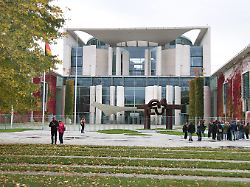Dispute over refugee costs
SPD state leaders are also increasing pressure on Scholz
November 6, 2023, 8:54 a.m
At the Prime Minister’s Conference, the state leaders also discussed refugees in Germany with the federal government. The Bavarian Prime Minister Söder is calling for a “fundamental change”, i.e. fewer recordings. The state leaders of the SPD are more frugal. They just want more money.
Ahead of a top meeting with Chancellor Olaf Scholz, several SPD-led states are increasing the pressure and demanding significantly more money for the care of refugees.
The states are already doing what they can, but the federal government also has to pay its fair share, said Lower Saxony’s Prime Minister Stephan Weil in ntv’s “Early Start”. “Instead, he is currently planning to cut his benefits – that’s not possible.” If the federal government says that it no longer has any financial leeway, that is a difficult statement, says Weil, because that would mean that everything else in the federal budget takes priority over supporting local authorities in the current situation.
Bremen’s mayor Andreas Bovenschulte told the editorial network Germany that the states and municipalities must be financially equipped so that they are not overwhelmed by the accommodation, care and integration of refugees. The federal government must therefore “noticeably increase its share of the costs in the long term, the states are in complete agreement on that.”
Mecklenburg-Western Pomerania’s Prime Minister Manuela Schwesig demanded that the federal government contribute half of the costs. “We advocate the introduction of a payment card, want to speed up procedures for refugees with poor prospects of staying and enable refugees with good prospects to take up work more quickly,” she told the RND newspapers. “We expect the federal government to contribute half of the costs on a long-term and reliable basis.”
Pressure also comes from Union-run federal states
Similar demands come from the Union-run federal states. North Rhine-Westphalia’s Prime Minister Hendrik Wüst called for benefits for asylum seekers in Germany to be reduced. There is a need for harmonization of payments in Europe, “and in relation to German benefits that means that they would go down,” said Wüst in the “Early Start”. There are many reasons why refugees make the journey to Germany from their country of arrival in Europe. “One reason is certainly the performance, which is higher here than elsewhere.”
Bavaria’s Prime Minister Markus Söder from the CSU is pushing for a “fundamental change in migration policy”. “The aim must be to ensure that those who are not entitled to protection can be effectively rejected at the German border,” he told the “Augsburger Allgemeine”.
“A clever further development of constitutional law should also be examined,” Söder told the newspaper. “National asylum procedures should – as far as possible – be carried out in third countries in the future,” continued the CSU politician. “It is also important to prevent applicants who have already been rejected from repeatedly submitting new applications.”
“Benefits in kind and payment card”
“In particular, incentives and social pull factors to Germany must be reduced by reducing national social benefits for refugees to European levels,” demanded Söder. “To achieve this, cash benefits must be consistently replaced by benefits in kind and a payment card.”
During the day, the state prime ministers will discuss with Chancellor Scholz, among other things, the future course of migration policy. This involves both the goal of reducing the number of asylum seekers entering the country and the distribution of funds by the federal and state governments. The states and municipalities are unanimously pushing for more financial support from the federal government.
